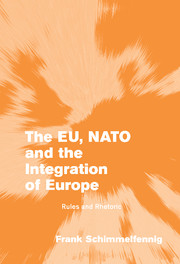Book contents
- Frontmatter
- Contents
- List of figures
- List of tables
- Acknowledgments
- List of abbreviations
- Introduction
- PART I Security, power or welfare? Eastern enlargement in a rationalist perspective
- PART II Expanding the Western community of liberal values and norms: Eastern enlargement in a sociological perspective
- PART III Association instead of membership: preferences and bargaining power in Eastern enlargement
- PART IV From association to membership: rhetorical action in Eastern enlargement
- Strategic action in international community: concluding remarks
- Appendix (Interviews)
- List of references
- Index
PART II - Expanding the Western community of liberal values and norms: Eastern enlargement in a sociological perspective
Published online by Cambridge University Press: 22 September 2009
- Frontmatter
- Contents
- List of figures
- List of tables
- Acknowledgments
- List of abbreviations
- Introduction
- PART I Security, power or welfare? Eastern enlargement in a rationalist perspective
- PART II Expanding the Western community of liberal values and norms: Eastern enlargement in a sociological perspective
- PART III Association instead of membership: preferences and bargaining power in Eastern enlargement
- PART IV From association to membership: rhetorical action in Eastern enlargement
- Strategic action in international community: concluding remarks
- Appendix (Interviews)
- List of references
- Index
Summary
In the course of the 1990s, sociological approaches to the study of international relations have increasingly challenged the dominance of rationalist theories. The debate between “rationalism” and “constructivism” – as the sociological approaches are now usually referred to – constitutes currently the focus of theoretical controversy in International Relations. Since the rationalist theories failed to explain why the EU and NATO should expand to include the CEECs, I turn therefore to sociological institutionalism in an attempt to solve the puzzle of Eastern enlargement.
Constructivist approaches to the study of international relations are more united by their rejection of basic theoretical premises of rationalism than by common positions. The basic divide within the constructivist camp is the epistemological difference between “modernist” and postmodernist constructivism. Modernist constructivism does not, in principle, question the epistemological commitment of rationalism to an empirical and explanatory, causally oriented social science. It should be clear from the purpose of this book, to explain enlargement by confronting competing hypotheses with the empirical evidence, that I take constructivist analysis to be compatible with modernist epistemology.
In the theoretical chapter (chapter 4), I discuss the basic premises of sociological institutionalism in International Relations, describe how sociological institutionalists theorize international organizations and their enlargement, and develop hypotheses. Subsequently, I describe the cultural foundations of the Western international community and probe the ability of sociological institutionalism to explain the Eastern enlargement of NATO and the EU (chapter 5).
- Type
- Chapter
- Information
- The EU, NATO and the Integration of EuropeRules and Rhetoric, pp. 67Publisher: Cambridge University PressPrint publication year: 2003

